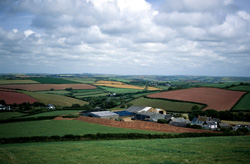Integrating the elements of rural development
Rural development policies are starting to widen the focus on farm structures: a broader framework considers the rural economy as well as the quality of life in rural areas. Included in this wider approach are environmental issues, food chain aspects, forestry and diversification. At the same time, governance patterns are starting to assume a bottom-up approach for fresh new local development strategies. An integrated and multidisciplinary take on rural development processes is needed for more effective policy actions that can support interactions between farming and the rest of the rural economy and environment. This means moving beyond the fragmented knowledge generated by hitherto sectoral or mono-disciplinary approaches. 'Enlarging the theoretical understanding of rural development' (ETUDE) is a project that developed and empirically tested an integrated conceptual framework that brought together several theoretical strands. These encompass the 'endogeneity' of rural economies, capacity of rural areas to produce 'novelties', institutional capacity to construct new markets, capacity to create new 'induced' forms of governance, development of flexible and cost-efficient forms of sustainability, and the role of social capital. The framework was 'loaded' with 63 cases from across Europe and tested through 12 in-depth regional case studies, which formed the basis for comparative regional analysis and evaluation. Partners were also thus able to identify the strengths and weaknesses of various rural development practices and approaches aimed at enhancing the potential for integrated rural development in a specific region. To disseminate their findings and share information, the EU-funded ETUDE organised two 'science and policy' seminars, and regional and national workshops, and held lectures for authorities and stakeholders as well as scientific audiences. A website was launched and a leaflet published that targeted a wider audience. Project publications include 'eStrategies projects Europe' and the book 'Unfolding webs, the dynamics of regional rural development'. Efforts resulted in advancing a number of policy recommendations for rural policymaking at various administrative levels. The work of projects like ETUDE promises to enhance rural activities at a time of economic stress for many of Europe’s nations.







